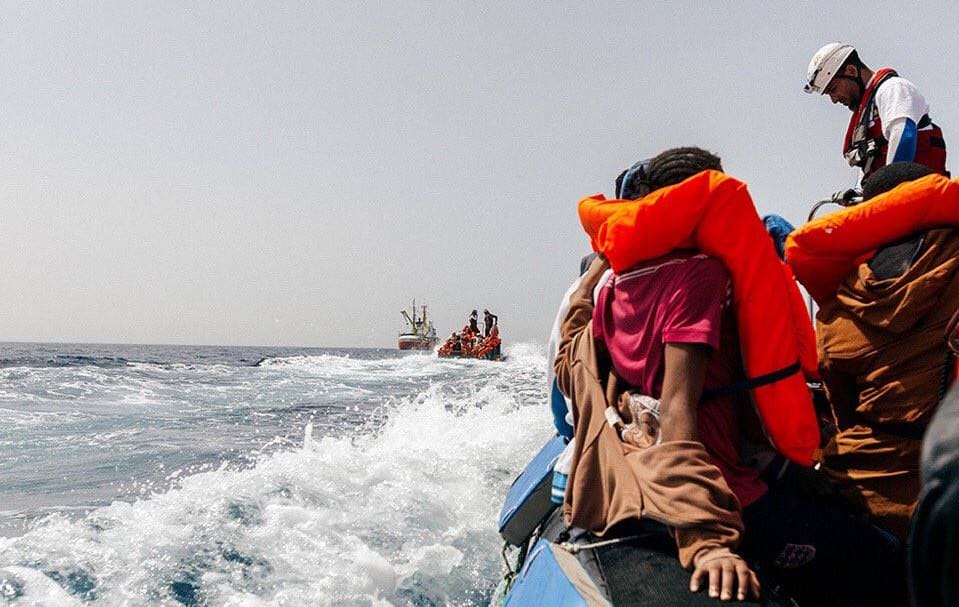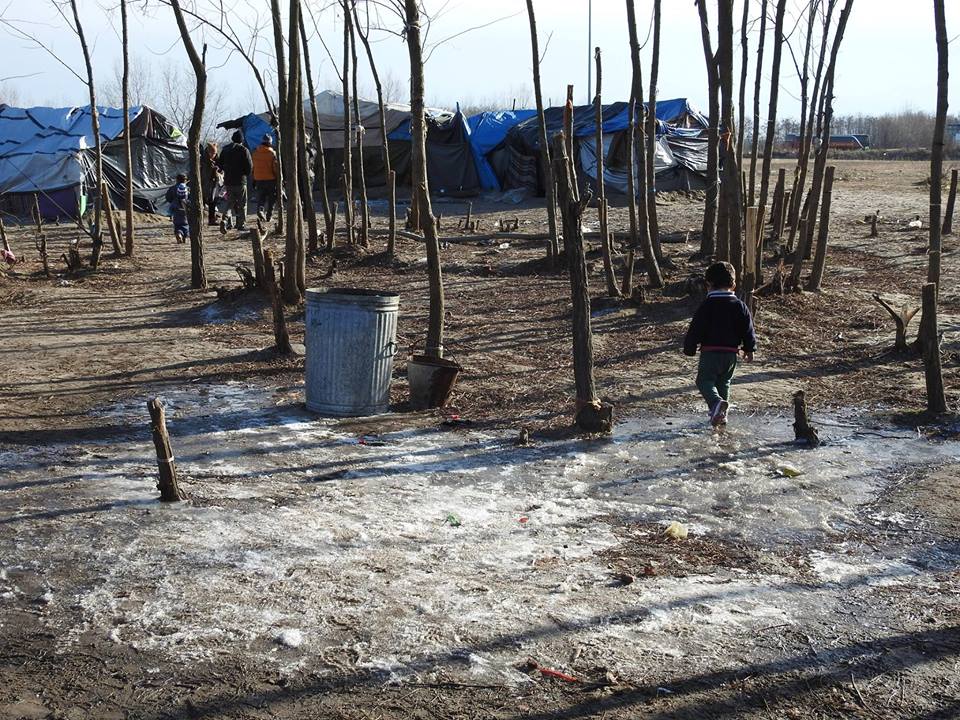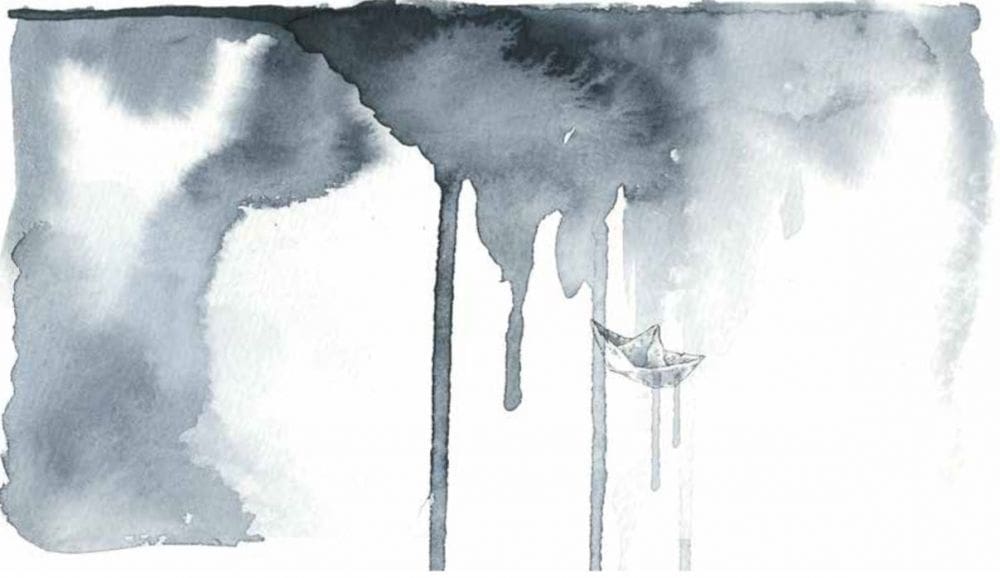Sea Rescue Operation to EU: Explain Yourself
After three days of complex operations in the central Mediterranean, SOS Méditerranée calls on European and international authorities to urgently clarify framework underlying Libyan Coastguard intervention in international waters
by SOS Méditerranée (Marseille/Palermo/Geneva/Berlin)
1 April 2018 (original post)
Between Thursday and Saturday, the Aquarius, chartered by SOS Méditerranée and operated in partnership with Médecins Sans Frontières (MSF), rescued a total of 292 people in distress in international waters off the coast of Libya in three separate operations.
Thursday and Friday: Two rescues
While patrolling on Thursday, 29 March, 25 nautical miles off the Libyan coast, the Aquarius rescue team located a rubber boat in distress. After duly coordinating with the Italian Maritime Rescue Coordination Center (IMRCC), 122 people were safely evacuated onto the Aquarius.
On Friday, 30 March, the Aquarius was called on again by the IMRCC for the rescue of a rubber boat in distress spotted by an Italian Navy helicopter 38 nautical miles north of Zuwarah. “This rescue was delicate,” explains Tanguy Louppe, SOS Méditerranée’s Deputy Search and Rescue (SAR) Coordinator. “The inflatable boat was in a poor condition, it was partially deflated and the floor was broken. We had to deploy rafts to secure people before they could be given lifejackets.”
While the rescue was underway, a Libyan Coastguard speedboat (648) approached the Aquarius at high speed. The rescue of 131 people in distress, including twelve women and 24 unaccompanied minors, was completed just before its arrival. Following completion of the rescue operation, the Aquarius informed IMRCC that it would remain on active watch in international waters with the 253 survivors aboard, as weather conditions were forecast to be favorable for further departures.
Saturday: 39 vulnerable people rescued, approximately 90 intercepted by Libyan Coastguard
On Saturday, 31 March, at 10:30, the Aquarius received a call from the IMRCC communicating the position of a vessel in distress identified by a maritime patrol aircraft, part of EU Navfor Med’s Operation Sophia. After approximately one hour of navigation, the inflatable boat was located by SOS Méditerranée’s rescue team.
At 11:34, the IMRCC informed the Aquarius that the Libyan Coastguard would be assuming the coordination of the operation (SAR Case 183). The IMRCC later instructed the Aquarius to evaluate the situation and to remain on standby, while not interfering with the rescue operation upon arrival of the Libyan Coastguard. As the first on site, the Aquarius recognized the need for stabilization of the situation. The overcrowded boat in distress continued to approach Aquarius and those aboard were in urgent need of lifejackets for their safety. The Aquarius then received a telephone call from the Libyan Coastguard operations center, which declared that it had assumed coordination. The Aquarius relayed to the Libyan Coastguard and its vessel Al Khifra (206)—which was en route to location but still distant—the urgent need to distribute lifejackets.
Upon authorization from the Libyan Coastguard, the Aquarius launched two of its rescue boats to start distributing lifejackets. During the stabilization process, rescuers noted the presence of children, including a newborn baby and a number of urgent medical cases, and received permission from the Libyan Coastguard vessel to evacuate the most vulnerable cases to the Aquarius, but were prohibited from rescuing the remaining passengers.
39 people, including a newborn, pregnant women, and many children with their parents were evacuated to the Aquarius. However, approximately 90 people were intercepted by the Libyan Coastguard and returned to Libya. During the interception, the Aquarius was ordered to remain at a distance.
Current conditions of rescue operations at sea are unacceptable
“The conditions of rescue operations at sea are ever more fraught with complications, as well as confusing and risky transfers of responsibility, which is unacceptable,” said Sophie Beau, vice President of SOS Méditerranée International. “Rescue vessels are forced to negotiate the evacuation of people in distress, the sick, injured, and exhausted, to a safe place on an arbitrary case-by-case basis, and in a tense and dangerous emergency situation on the high seas. Life-saving assets at sea are becoming increasingly scarce, and at the same time operations are being delayed, human lives are put at risk, and rather than prioritizing their safety, people in distress are returned to Libya.”
“We are neither lawyers nor political decision-makers,” said Beau. “We are a European civil association of sea rescuers aboard an ambulance ship, which helps where people are in danger of death. Since the very beginning of our mission in March 2016, we have consistently respected international maritime law, the maritime authorities, and worked in respect of principles of humanity and solidarity on which Europe was founded and that are the DNA of seafarers. In the absence of a clear, public, and transparent protocol governing the intervention of the Libyan Coastguards in international waters off Libya, we urge the relevant European and international bodies to clarify the framework governing the actions of the various actors in this maritime area, which is the deadliest in the world. If this framework has recently changed and no longer allows us to save all lives in danger, if we can no longer carry out our mission safely, we believe that we and all other European citizens should be the first ones to be informed.”
Sunday, 1 April: the Aquarius is now heading north to disembark the 292 rescued people in Messina (Italy), a “place of safety,” following instructions of the IMRCC. The people rescued between Thursday and Saturday come from more than twenty nations, ranging from West African countries to Somalia, Egypt, Libya, Pakistan, and Bangladesh. Among them are at least five pregnant women, nine children, and 54 unaccompanied minors.
Featured image source: SOS Méditerranée (Facebook). © Yann Levy
For further information: contact phone numbers and email addresses are listed in the original press release.





